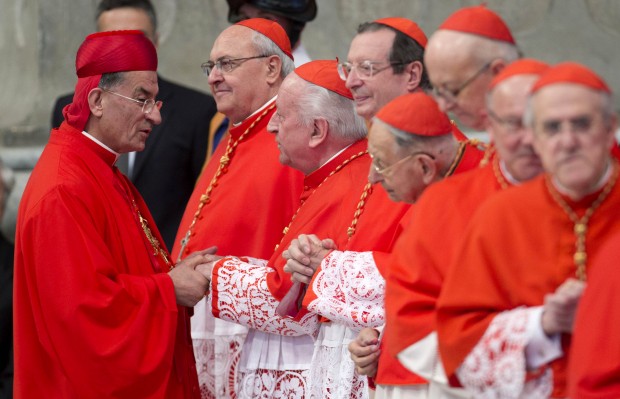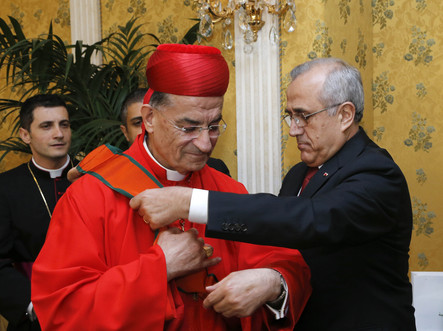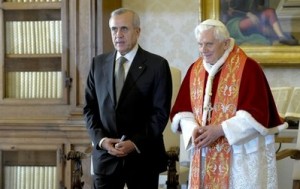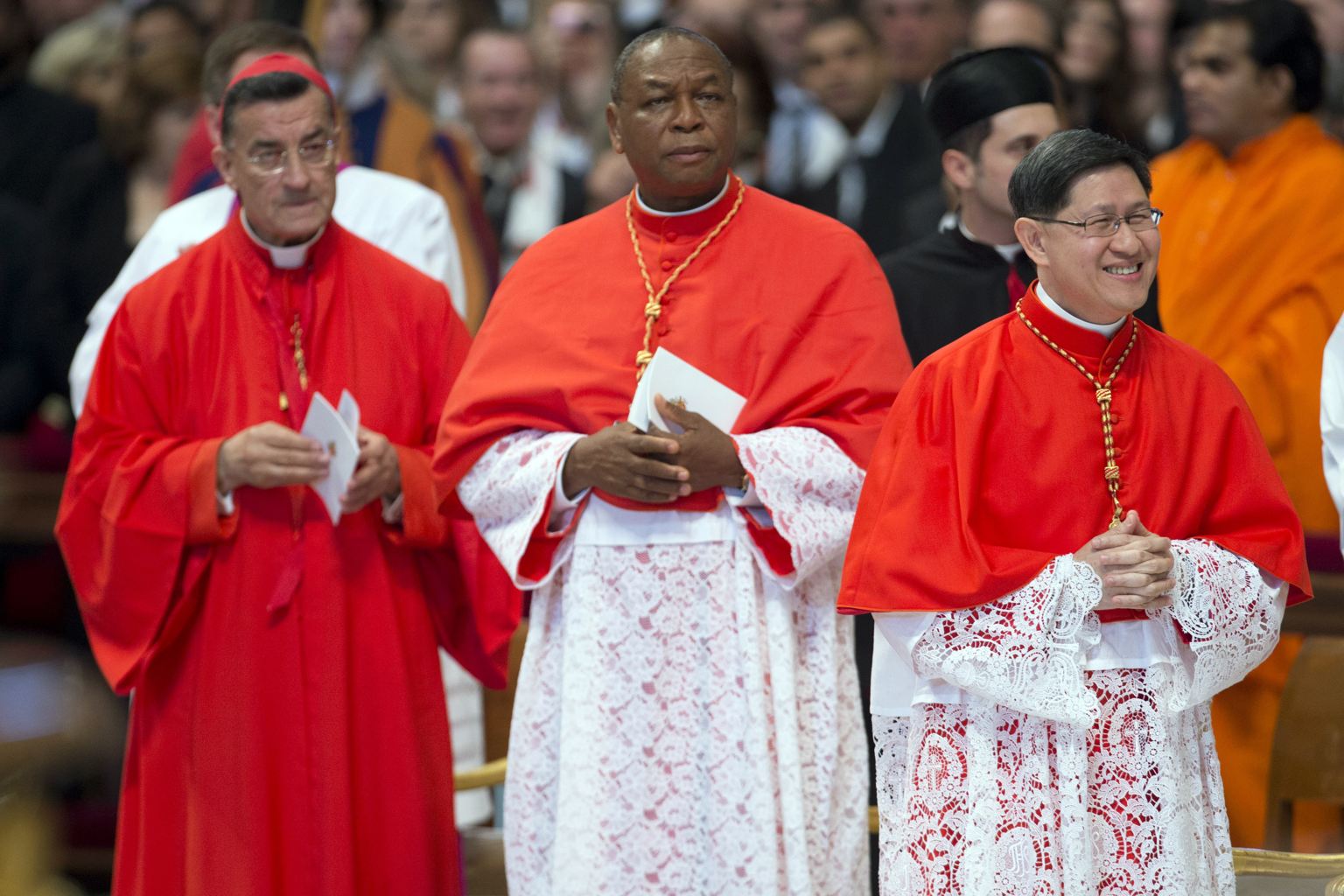khazen.org, "Our joy has no limit!" Glory to our New Cardinal Patriarch!!! Khazen.org congratulates the Maronite Church and Maronite for the new appoitment of the Cardinal Patriarch Mar Bechara el Rahi – Glory of Lebanon is given to you – All of the khazen will serve as your servants Cardinal Patriarch Mar Bechara Al Raai. The khazen family pray for the new Catholic Maronite mission and Cardinal Patriarch to continue, in strengthening and lead he Maronite Catholic Nation all around the World.




From left, Newly-elected Cardinals His Beatitude Bechara Boutros Rai, Patriarch of Antioch of the Maronites in Lebanon, Nigeria’s Archbishop John Olorunfemi Onaiyekan, and Philippines Archbishop Luis
.- Pope Benedict XVI presided over the creation of six new cardinals Nov. 24, and in a unusual occurrence, none of them were European.
The consistory took place at 11 a.m. on Saturday in St. Peter’s Basilica and involved bishops from the United States, Lebanon, India, Nigeria, Colombia and the Philippines. During the ceremony, the men all received rings from the Pope and made vows to him.
Pope Benedict XVI asked the new cardinals to focus on fidelity and the universality of the Church.
"I want to highlight the fact that the Church is the Church of all peoples, and so she speaks in the various cultures of the different continents," said Pope Benedict.
As part of becoming cardinals, they vowed to "cooperate more directly with Benedict XVI and his canonically elected successors" and "to not make known to anyone matters entrusted to me in confidence, the disclosure of which could bring damage or dishonor to the Holy Church."
"What makes the Church catholic is the fact that Christ in his saving mission embraces all humanity," said Pope Benedict.
He said in his homily that "by following Jesus one enters a new kingdom that conquers fragmentation and dispersal."
"Jesus promises that they (the apostles) will be filled with the power of the Holy Spirit, and he confers upon them the task of bearing witness to him all over the world, transcending the cultural and religious confines within which they were accustomed to think and live, so as to open themselves to the universal Kingdom of God," said Pope Benedict.
The six men who received the honor were the American Archbishop James Michael Harvey, Lebanese Patriarch Bechara Boutros Raï, Indian Major Archbishop Baselios Cleemis Thottunkal, Nigerian Archbishop John Olorunfemi Onaiyekan, Colombian Archbishop Rubén Salazar Gómez and Filipino Archbishop Luis Antonio Tagle.
"It’s so exciting to be here and have a Nigerian as one of the cardinals," said Honorus Obasi, who works for the Nigerian embassy to Italy.
"It’s a great occasion because the Church is developing in Africa and creating a Nigerian cardinal will help the country," he added.
"Cardinal John Onaiyekan is a very humble” and outspoken man. “We’re very proud and happy to have him here," said Obasi.
Popes usually create cardinals every two or three years, but this marks the second consistory in 2012, after Pope Benedict held one on Feb. 18 for the creation of 22 cardinals.
The six new cardinals are all under the age of 80, which means they are eligible to vote on who will be the next Pope, alongside 120 other cardinals.
Today’s consistory was also notable because it is the first one in decades at which no Europeans were made cardinals.
The Lebanese, whose president also attended the event, expressed their joy of having more representation in the Vatican with Patriarch Bechara Boutros Raï becoming their second cardinal.
"I’m so happy because our country is so small, but we can still now be a part of the Vatican with our second cardinal," said Tanya Daccache, visiting from Keserwan, Lebanon.
"This is going to help Christians in the Middle East because it’s going to force Muslims to respect us more," she added.
"The Arab Spring has been severely affecting Christians and we want to be able to stay there. We have a big duty to raise our children with the mentality of staying in Lebanon."
"We’re such a small country, but we have seven saints," Daccache added.
A Lebanese entrepreneur who lives in France said he feels that the elevation of Patriarch Raï was a gift from God.
"It’s a donation from God because he is such a great person, and it’s a huge and great pleasure to have our patriarch be a cardinal," said Raymond Elasmar.
"We’re hoping we will now be more protected in the Middle East, and we hope God gives him the health and the energy to guide all of us," he said.
Henrietta Devilla, the former Philippine ambassador to the Holy See, is a friend of the newly-created Philippine cardinal.
"It’s a sign of grace for the Philippines," she said. "I know him personally, and he’s brilliant man and very compassionate."
"You don’t have to bow to him or anything. He’s like Jesus who didn’t come to be served but to serve," Devilla remarked.
"We’re very grateful to the Holy Father for doing this because we’re the only Christian nation in Asia," she said.
Devilla also noted that Cardinal Tagle is the “only active cardinal because our other two are Emeritus."
BEIRUT (CNS) — Catholics in Lebanon said Pope Benedict XVI’s naming of Maronite Patriarch Bechara Rai as a cardinal reinforces the church’s support for Christians in the Middle East.
The appointment is “a sign of support and affirmation for the Christians of the Middle East and a support for the Christian presence in the region,” Archbishop Paul Sayah, vicar general of the Maronite Patriarchate in Bkerke, told Catholic News Service.
“It is a sign of support and affirmation for Lebanon in the present situation the country is going through,” Archbishop Sayah said. “Last but not least, the elevation of Patriarch Rai to the rank of cardinal is a sign of the confidence the Holy See has in the person of His Beatitude and the clear support for his vision and the style of ministry he has been exercising.”
The patriarch is one of six new cardinals who will be elevated in a consistory at the Vatican Nov. 24. Maronite Father Camille Mubarak, president of Sagesse University in Beirut, said Cardinal-designate Rai’s elevation “is good for the peace for all the people of the Middle East — Muslims and Christians.”
He, too, emphasized that the appointment confirmed that the plight of Christians in the Middle East “that was ignored is now included in the political geography of the world.”
When he was elected patriarch of the Maronite Catholic Church in March 2011, Cardinal-designate Rai was seen as someone who could unite Maronite Catholics, who had been divided among political party lines.
“He has a deep spirituality, and he is very sociable and open to the others, and he has great courage. He says the truth even if someone doesn’t want to listen to it,” said Father Joseph Mouawad, patriarchal vicar at the Maronite Patriarchate.
Syrian Catholic Patriarch Ignatius Youssef III Younan called the new patriarch “a good friend, an outstanding leader and well-gifted bishop” and spoke of his “intense spirituality, solid formation and openness of heart.”
Two months after he was elected, the patriarch held his first Muslim-Christian summit. In September 2011, at his suggestion, spiritual leaders of Lebanon’s 18 religious sects met at Dar al-Fatwa, the official seat of the grand Sunni mufti, who has religious authority over the Sunni Muslims in Lebanon.
Cardinal-designate Rai also has gathered Lebanese political leaders in an effort to dissipate divisions among them.
He was born Feb. 25, 1940, in Himlaya, Lebanon. He attended high school at the Jesuits’ College of Notre Dame of Jamhour College. In 1962 he joined the Maronite Order of the Blessed Virgin Mary, and he studied philosophy and theology at the Pontifical Lateran University in Rome.
He earned a license in theology and a doctorate in canon and civil law, and he was ordained to the priesthood Sept 3, 1967. For many years, was director of the scholasticate of his order in Rome.
He founded the Institute of Foreign Languages at Louaize, was principal of St. Rita’s School in Dbaye and served as a judge on the Maronite patriarchal tribunal.
In May 1986, the Maronite synod elected him a patriarchal vicar, similar to an auxiliary bishop. In June 1990, he was transferred as the bishop of the new Eparchy of Jbeil.
He has been a member of a number of Synods of Bishops at the Vatican, including the synods on the Middle East and on the new evangelization.
He also had been a member of the permanent Synod of the Maronite Church and, in 2009, became president of the communications commission of the Synod of Catholic Patriarchs and Bishops in Lebanon. In 2010, Pope Benedict named him a member of the Pontifical Council for Social Communications.



